After you have grown your hornworms to full size you may wonder what to do when it is time to pupate. You might even wonder how to tell when they are ready to pupate.
The hornworms will grow to over three inches prior to pupating.

Once they reach this size there will come a time when they stop eating and start roaming around. They will then change to a lighter color and you can see the vein pulsing on their back. This is when they are ready to go in to the dirt.

There are many options for substrate, I prefer to use eco earth. Some people also use soil, moss or I have heard of just using paper towels to keep them. I have had the best experience using eco earth. When they are ready just put them in the container that has the moist substrate and they will burrow when ready.

Some may burrow immediately while others may take a day or two. I usually keep the dirt containers in a large bin as they tend to roam all over during this stage and will climb out of the container.

After burrowing they will slowly begin to pupate. They will change from green to brown and eventually harden. It is very important to mist the dirt daily to ensure proper development of the moths. One major result of failing to keep them moist is stunted wing development in moths. If the moths have stunted wings they will not be able to fly and will not survive. You may also want to arrange a light as a longer day cycle (14-17 hrs) will result in faster moth development. If they are on a short day cycle (12 hrs) they could go in to diapause that can last for months.

I usually dig my pupated worms up after about a week or so and transfer them to new containers of fresh dirt. I do this because I have lost entire batches due to a worm that burrowed only to die and rot or due to feces being in the soil and molding. Many times that I do this I do indeed find a dead worm in the soil.
You can also dig them up and place them on 3 or 4 paper towels rather than in new soil. The paper towels will help to keep them moist and reduce the mess.
In my next post I will cover moth cage set up and care.
Part 4 Hornworm Moth set up and care
The hornworms will grow to over three inches prior to pupating.
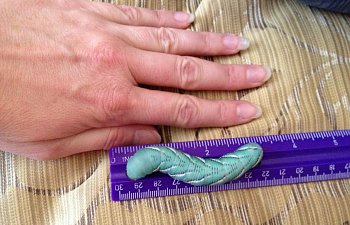
Once they reach this size there will come a time when they stop eating and start roaming around. They will then change to a lighter color and you can see the vein pulsing on their back. This is when they are ready to go in to the dirt.
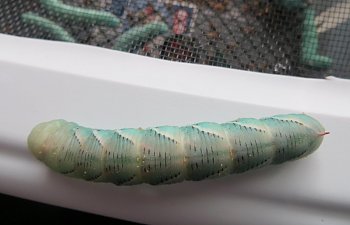
There are many options for substrate, I prefer to use eco earth. Some people also use soil, moss or I have heard of just using paper towels to keep them. I have had the best experience using eco earth. When they are ready just put them in the container that has the moist substrate and they will burrow when ready.
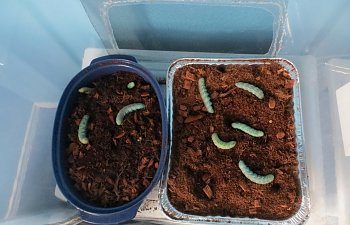
Some may burrow immediately while others may take a day or two. I usually keep the dirt containers in a large bin as they tend to roam all over during this stage and will climb out of the container.
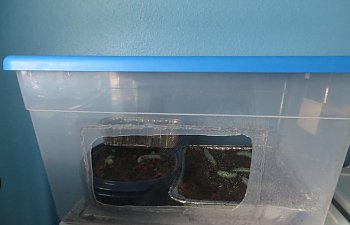
After burrowing they will slowly begin to pupate. They will change from green to brown and eventually harden. It is very important to mist the dirt daily to ensure proper development of the moths. One major result of failing to keep them moist is stunted wing development in moths. If the moths have stunted wings they will not be able to fly and will not survive. You may also want to arrange a light as a longer day cycle (14-17 hrs) will result in faster moth development. If they are on a short day cycle (12 hrs) they could go in to diapause that can last for months.
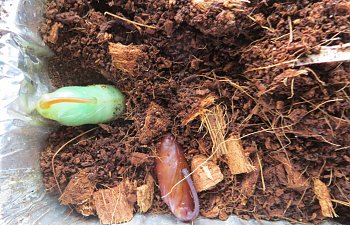
I usually dig my pupated worms up after about a week or so and transfer them to new containers of fresh dirt. I do this because I have lost entire batches due to a worm that burrowed only to die and rot or due to feces being in the soil and molding. Many times that I do this I do indeed find a dead worm in the soil.
You can also dig them up and place them on 3 or 4 paper towels rather than in new soil. The paper towels will help to keep them moist and reduce the mess.
In my next post I will cover moth cage set up and care.
Part 4 Hornworm Moth set up and care
